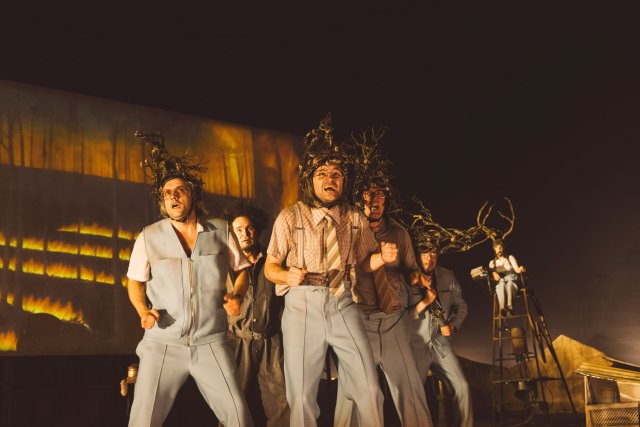Berliner Theatertreffen | Dramaturgically tested
The Deutsches Schauspielhaus Hamburg has been invited to the Theatertreffen with two productions, and a third, "The Shadow Presidents. Or: Behind Every Great Idiot There Are Seven Women Trying to Keep Him Alive," was among the 38 nominations. Fittingly for the 2024 Theater of the Year, one could say.
With “Bernarda Alba’s House” (by Alice Birch after Federico García Lorca) and “The Machine or: There is Peace Above All Summits” (by Georges Perec and Johann Wolfgang von Goethe), two productions as remarkable as they are different are now visiting Berlin.
"Bernarda Alba's House" is already a rather unpleasant place in Federico García Lorca's novel. After the death of the head of the family, the mother imposes extended mourning on herself and her five daughters under house arrest. This is a lot to ask of young people, which is why the mother doesn't shy away from physical violence to assert herself. This isolation from a world that is propagated internally as hostile, with raping men outside, can certainly also be read as a parable of fascism.
Katie Mitchell staged the play as a claustrophobic dystopia in Hamburg in November 2024. Eduarda Alba pursues the continuation of patriarchal structures in a dark realism, while precisely choreographed slow-motion sequences illustrate time jumps and dialogues are cleverly edited. The ensemble performs with utmost precision, which also demands considerable concentration from the audience. Perhaps, however, it's not so important to always be on top of the gruesome events. The delusion that develops in the claustrophobic atmosphere is vivid enough; Melanie Wilson's soundscape, which builds to violent peaks, contributes to this. An intense 90 minutes.

The second invited production is no less precisely staged and just as long, but otherwise of a completely different nature: Georges Perec conceived "The Machine or: There's Peace Above All Summits" as a radio play for Saarländischer Rundfunk in 1968. Goethe's famous poem "Wanderer's Night Song" is dissected, analyzed, associated, recombined—in short, stripped of its usual authority by a computer. Anita Vulesica, a Perec specialist and first-time director at the Schauspielhaus, has now put Perec's work, and thus Goethe, through the dramaturgical wringer.
Sandra Gerling acts as "control" in a retrofuturistic mechanical setting, behind which lies a stylized forest clearing with space for an expressive dance. Christoph Jöde, Moritz Grove, and Daniel Hoevels act as "storage" and engage in various linguistic operations. Camill Jammal, among other things, provides sound recordings. Yorck Dippe occasionally appears as Perec himself, providing commentary.
Here, too, the precision with which the ensemble brings this breakneck linguistic experiment to the stage is striking, revealing a great deal about poetry itself, about language (and its science), about Goethe and German longings, about endangered bird species and high mountains. At the same time, this evening is also delightfully funny.
Big, daring theater with which the Deutsches Schauspielhaus proves that it is one of the most exciting German theaters of the present day.
Performances of "Bernarda Alba's House": May 2nd and 3rd. (The production can also be seen in its entirety in the 3Sat media library.) Performances of "The Machine or: Peace Above All Summits": May 6th and 7th.
nd-aktuell



